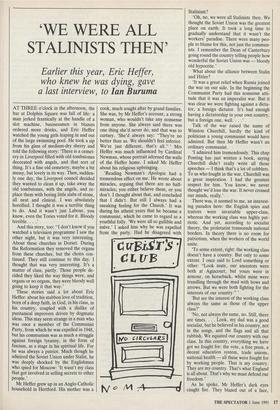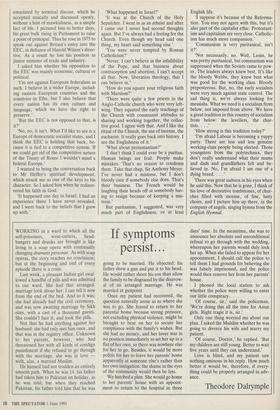`WE WERE ALL STALINISTS THEN'
Earlier this year, Eric Helfer, who knew he was dying, gave
a last interview, to Ian Buruma AT THREE o'clock in the afternoon, the bar at Dolphin Square was full of life: a man jerked frantically at the handle of a slot machine, businessmen in blazers ordered more drinks, and Eric Helfer watched the young girls leaping in and out of the large swimming pool. He took a sip from his glass of medium-dry sherry and told the following story: 'There is a cemet- ery in Liverpool filled with old tombstones decorated with angels, and that sort of thing. It's a fine old cemetery, maybe a bit messy, but lovely in its way. Then, sudden- ly one day, the Liverpool council decided they wanted to clean it up, take away the old tombstones, with the angels, and re- place them with boring little slabs of stone, all neat and clinical. I was absolutely horrified. I thought it was a terrible thing to do. And it wasn't just Labour, you know, even the Tories voted for it. Bloody terrible. . .
And this story, too: "I don't know if you watched a television programme I saw the other night, but it was very interesting. About these churches in Dorset. During the Reformation they removed the organs from these churches, but the choirs con- tinued. They still continue to this day. I thought that was very interesting. It's a matter of class, partly. Those people de- cided they liked the way things were, and organs or no organs, they were bloody well going to keep it that way.'
These stories said a lot about Eric Heifer: about his stubbon love of tradition, born of a deep faith, in God, in his class, in his country, coupled with a dislike of puritanical improvers driven by dogmatic ideas. This may seem strange in a man who was once a member of the Communist Party, from which he was expelled in 1948, but his communism was as much a struggle against foreign tyranny, in the form of fascism, as a stage in his spiritual life. For he was always a patriot. Much though he admired the Soviet Union under Stalin, he was deeply shocked by the Englishmen who spied for Moscow: 'It wasn't my class that got involved in selling secrets to other people.'
Mr Heifer grew up in an Anglo-Catholic household in Hertford. His mother was a cook, much sought after by grand families. She was, by Mr Heifer's account, a strong woman, who wouldn't take any nonsense from anyone. She always said there was one thing she'd never do, and that was to curtsey. 'She'd always say: "They're no better than us. We shouldn't feel inferior. We're just different, that's all." ' Mrs Heifer was much influenced by Cardinal Newman, whose portrait adorned the walls of the Heifer home. I asked Mr Hafer about his religious upbringing.
`Reading Newman's Apologia had a tremendous effect on me. He wrote about miracles, arguing that there are no half- miracles; you either believe them, or you don't. I thought about that, and concluded that I didn't. But still I always had a sneaking feeling for the Church.' It was during his atheist years that he became a communist, which he came to regard as a youthful folly. 'We were all so gullible and naive.' I asked him why he was expelled from the party. Had he disagreed with Stalinism?
`Oh, no, we were all Stalinists then. We thought the Soviet Union was the greatest place on earth. It took a long time to gradually understand that it wasn't the workers' paradise. There were many peo- ple to blame for this, not just the commun- ists. I remember the Dean of Canterbury going round the country telling people how wonderful the Soviet Union was — bloody old hypocrite.'
What about the alliance between Stalin and Hitler?
`It was a great relief when Russia joined the war on our side. In the beginning the Communist Party had this nonsense atti- tude that it was an imperalist war. But it was clear we were fighting against a dicta- tor, a foreign dictator. It's bad enough having a dictatorship in your own country, but a foreign one, well. . .
Talk of the war raised the name of Winston Churchill, hardly the kind of politician a young communist would have admired. But then Mr Heifer wasn't an ordinary communist.
`I admired him tremendously. This chap Ponting has just written a book, saying Churchill didn't really write all those speeches — I think that's a lot of cobblers. To us who fought in the war, Churchill was a great inspiration. I had the greatest respect for him. You know, we never thought we'd lose the war. It never crossed our minds, really.'
There was, it seemed to me, an interest- ing paradox here: the English spies and traitors were invariable upper-class, whereas the working class was highly pat- riotic. And yet, according to socialist theory, the proletariat transcends national borders. In theory there is no room for patriotism, when the workers of the world unite.
To some extent, right: the working class doesn't have a country. But only to some extent. I once said to Lord something or other: "Look mate, our ancestors were both at Agincourt, but yours were in armour, on horseback, whilst mine were trundling through the mud with bows and arrows. But we were both fighting for the interests of our country." ' `But are the interest of the working class always the same as those of the upper class?'
`No, not always the same, no. Still, there are times. . . . Look, my dad was a good socialist, but he believed in his country, not in the songs, and the flags and all that rubbish. We equated our country with our class. In this country, everything we have got we fought for: the vote, a free press, a decent education system, trade unions, national health — all these were fought for by working people. That is my country. They are my country. That's what England is all about. That's why we must defend our freedom.'
As he spoke, Mr Heifer's dark eyes caught fire. They blazed out of a face, emaciated by terminal disease, which he accepted stoically and discussed openly, without a hint of mawkishness, as a simple fact of life. I pictured him in better days, his great bulk rising in Parliament to raise a point of principal. Thus he rose in 1975 to speak out against Britain's entry into the EEC, in defiance of Harold Wilson's direc- tive. As a result he lost his position as junior minister of trade and industry.
I asked him whether his opposition to the EEC was mainly economic, cultural or political.
'I'm not against European federalism as such. I believe in a wider Europe, includ- ing eastern European countries and the countries in Efta, but I also believe that every nation has its own culture and language, which we have the right to preserve.'
'But the EEC is not opposed to that, is it?'
'No, no, it isn't. What I'd like to see is a Europe of democratic socialist states, and I think the EEC is holding that back, be- cause it is tied to a competitive system. If we could get rid of the competitive nature of the Treaty of Rome I wouldn't mind a federal Europe.'
I wanted to bring the conversation back to Mr Heffer's spiritual development, which struck me as one of the keys to his character. So I asked him when he redisco- vered his faith in God.
'It happened one day in Israel. I had an experience there I have never revealed, and I went back to the beliefs that I grew up with.' `What happened in Israel?'
'It was at the Church of the Holy Sepulchre. I went in as an atheist and after I came out I never had second thoughts again. But I've always had a feeling for the Church. Even though my head said one thing, my heart said something else.'
`You were never tempted by Roman Catholicism?'
'Never. I can't believe in the infallibility of the Pope, and that business about contraception and abortion. I can't accept all that. Now, liberation theology, that I can believe in.'
'How do you square your religious faith with Marxism?'
'There were quite a few priests in the Anglo-Catholic church who were very left- wing. They equated the early teachings of the Church with communist attitudes to sharing and working together, the collec- tive good. I agree with that. And I like the ritual of the Church, the use of incense, the eucharist. It really goes back into history. I see the Englishness of it.'
'What about protestantism?'
'I don't think I could ever be a puritan. Human beings are frail. People make mistakes. That's no reason to condemn them. Take that chap, Sir Anthony Meyer. I've never had a mistress, but I don't bloody care if somebody else does. That's their business. The French would be laughing their heads off at somebody hav- ing to resign because of keeping a mis- tress.'
But puritanism, I suggested, was very much part of Englishness, or at least English life.
'I suppose it's because of the Reforma- tion. You may not agree with this, but it's also part of the capitalist ethic. Protestant- ism and capitalism are very close. Catholic- ism has much more compassion.'
`Communism is very puritanical, isn't it?'
'Not necessarily, no. Well, Lenin, he was pretty puritanical, but communism was suppressed when the Soviets came to pow- er. The leaders always knew best. It's like the bloody Webbs, they knew best what was good for the working class. Bloody preposterous. But, no, the early socialists were very much against state control. The sad thing is, we're always looking for messiahs. What we need is a socialism from below, not imposed from above. We have a great tradition in this country of socialism from below: the levellers, the char- tists. . .
'How strong is this tradition today?'
'I'm afraid Labour is becoming a yuppy party. There are less and less genuine working-class people being elected. Those youngsters from the polytechnics, they don't really understand what their mums and dads and grandfathers felt and be- lieved in. No, I'm afraid I am one of a dying breed. . .
There was great sadness in his eyes when he said this. Now that he is gone, I think of his love of decorative tombstones, of chur- ches filled with incense, of fine, lusty choirs, and I picture him up there, in the company of angels, singing hymns from the English Hymnal.



















































 Previous page
Previous page